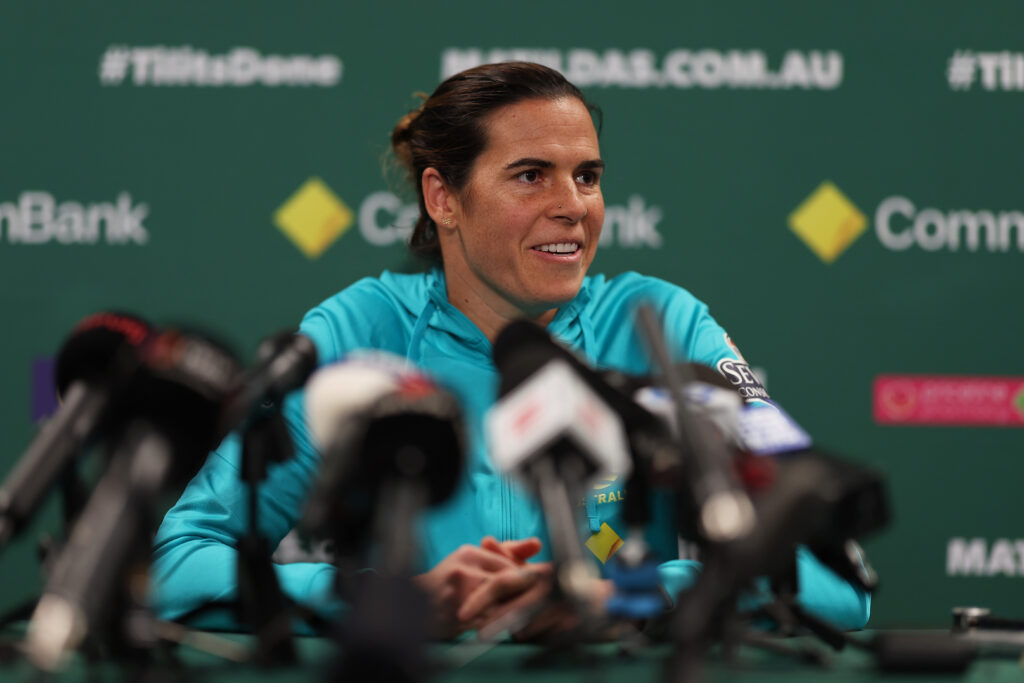While men’s sport has always received it’s fair share of media coverage, it’s only in recent years that women’s sport has started to receive the attention it deserves in the mainstream media.
Media coverage of women’s sport has traditionally been done by dedicated, passionate fans wanting to grow the women’s game, and whilst women’s sports media has made leaps and bounds over the years, women sports journalists are still placed under the microscope for their expertise and understanding of sport – far more so than their male colleagues.
Former Matildas goalkeeper Lydia Williams knows this as a reality. She, like a handful of other retired elite athletes, is considering a career in sports media to give back to the game she loves. But she also knows just how high the bar is for her, compared to her male counterparts.
“I think the journalistic side of things hasn’t quite caught up with the demands of women’s sport,” Williams tells Women’s Agenda.
“Women in sports media hasn’t reached that level of equality and opportunities that the men’s side has done for multiple years. More scrutiny is placed on women in media because they haven’t had the opportunity to really be given the time to allow themselves to get their education.”
The impact of this pressure on women in sports media is unquestionable: in the financial year ending June 2024, just 27 per cent of sports news bylines were contributed by female journalists in Australia.
And the fewer women in sports journalism, the less likely it is that women’s sport gets covered at all. According to research from the Victorian government, female journalists are 62 per cent more likely than male journalists to report on women’s sport.
Williams said the media industry must “bridge that gap” in coverage of women’s sport – and part of that effort starts with getting more women involved, without the intense “scrutiny” placed on them from viewers and readers simply because they are women.
“Women don’t have the opportunity to have mentors to help them through that scrutiny,” Williams said. “They’re kind of left to their own devices to figure out on their own.”
This year, Williams will join a group of 17 media professionals to participate in the Victorian government’s Change Our Game Women in Sports Media Program for 2024/25.
Run by Emma Race and Lucy Race from women in sports media advocacy organisation Making The Call, the program aims to strengthen the knowledge and skills of participants, connect them with representatives from the media industry and support participants as they progress their careers in sports media.
Ros Spence, Victoria’s Minister for Community Sport, said the program has helped over 100 women and aims to continue supporting journalists covering women’s sport: “Whether that is in front of or behind the camera or microphone or through print and online channels.”
Minister for Women Natalie Hutchins said the government’s Change Our Game program will contribute to the united effort to promote women’s sport across the state and ultimately across the country.
“Only 27 per cent of sports news bylines were contributed by women in the last year,” Minister Hutchins said.
“Programs like Change Our Game will enable outstanding women to continue building careers in the sports media industry and shape the stories that are told across Victoria.”
Sarah Styles, the Director of the Office for Women in Sport and Recreation, reiterated the importance of including women’s sport in media, especially in Australian media, where sport is the number one topic.
“Sport is covered in our media more than any other topic,” Styles said.
“This program is ensuring more women are shaping that conversation and building their careers across the full spectrum of sports media.”
In June this year, Williams gave an emotional farewell to the game she loves, retiring from football after an impressive 19-year career. Participating in the Change Our Game media program, for her, is giving back to the sport that gave her so much over two decades.
“I really enjoy analytics, and I have a lot of knowledge from 20 years of playing,” Williams told Women’s Agenda.
“My body is failing, so I can’t really be on the physical side of things anymore. I like to think in terms of mentality and understanding the game, my mind is still sharp.
“I just want to give back to the game in any way I can, and I feel like getting into sports media is a really good opportunity to show that knowledge on a different side.”

